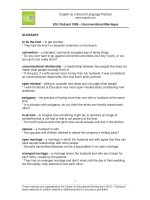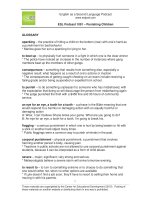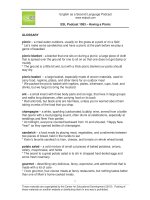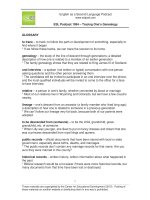ESLPod 1089 guide Want to be Fluent in English?
Bạn đang xem bản rút gọn của tài liệu. Xem và tải ngay bản đầy đủ của tài liệu tại đây (88.93 KB, 9 trang )
English as a Second Language Podcast
www.eslpod.com
ESL Podcast 1089 – Unconventional Marriages
GLOSSARY
to tie the knot – to get married
* They tied the knot in a beautiful ceremony on the beach.
convention – a standard, commonly accepted way of doing things
* Do you ever want to go against convention and dress your boy in pink, or cut
your girl’s hair really short?
unconventional relationship – a relationship between two people that does not
match what people normally think of
* In the past, if a wife earned more money than her husband, it was considered
an unconventional relationship. But now that’s fairly common.
open-minded – willing to consider new ideas and not judge other people
* I wish the Board of Education was more open-minded about considering new
textbooks.
polygamy – the practice of having more than one wife or husband at the same
time
* In a situation with polygamy, do you think the wives are friendly toward each
other?
to picture – to imagine how something might be; to perceive an image of
something that is not real or that is not present at the time
* It’s hard to picture what that paint color would actually look like in the kitchen.
spouse – a husband or wife
* Are spouses and children allowed to attend the company’s holiday party?
open marriage – a marriage in which the husband and wife agree that they can
have sexual relationships with other people
* Sexually transmitted diseases can be a big problem in an open marriage.
arranged marriage – a marriage where the husband and wife are chosen for
each other, usually by the parents
* They had an arranged marriage and didn’t meet until the day of their wedding,
but fortunately, they learned to love each other.
1
These materials are copyrighted by the Center for Educational Development (2015). Posting of
these materials on another website or distributing them in any way is prohibited.
English as a Second Language Podcast
www.eslpod.com
ESL Podcast 1089 – Unconventional Marriages
May-December romance – a romantic relationship between two people with a
significant difference in age
* Did you know that Gerald is dating someone who is 24 years younger than he
is? Talk about a May-December romance!
to apply to – to be relevant or applicable to someone, especially when talking
about a rule
* These diet restrictions don’t apply to you because you don’t have high blood
pressure like I do.
to live apart – to live separately; to not share a home or other residence
* Spencer got a good job offer in Anchorage, but if he accepts it, they’ll have to
live apart for a few months until she can move up there with him.
to retain – to keep; to continue to have; to not let something go or be taken
* It’s not uncommon for adult immigrants to retain their language, eating habits,
and cultural beliefs and customs.
to cohabitate – to live together in the same place, especially with a romantic
partner
* Many religions teach that it’s wrong to cohabitate before marriage.
dating – the early stages of a romantic relationship where two people spend time
together in different activities to get to know each other better, before they have
made a serious commitment to each other
* Liana doesn’t have much of a dating history, because her parents refused to let
her date while she was in high school.
2
These materials are copyrighted by the Center for Educational Development (2015). Posting of
these materials on another website or distributing them in any way is prohibited.
English as a Second Language Podcast
www.eslpod.com
ESL Podcast 1089 – Unconventional Marriages
COMPREHENSION QUESTIONS
1.
a)
b)
c)
What is an arranged marriage?
A marriage in which the spouses were chosen by someone else.
A marriage with a lot of rules, order, and structure.
A marriage where a working spouse gives money to the non-working spouse.
2.
a)
b)
c)
What is a May-December romance?
A romantic relationship where one person is much older than the other.
A romantic relationship that lasts for only seven months.
A romantic relationship that ends before the new year.
______________
WHAT ELSE DOES IT MEAN?
convention
The word “convention,” in this podcast, means a standard, commonly accepted
way of doing things: “By convention, most pre-school teachers are women, but
gradually, it’s becoming more acceptable for men to be pre-school teachers, too.”
A “convention” is often a very large meeting attended by many people: “The city
is hosting a national writer’s convention next month.” Or, “Each year, the
company sends a few representatives to the convention to learn more about
what is happening in the industry.” When talking about government, a
“convention” is an official agreement between two countries: “What does the
convention on human rights say about children’s right to education?” Finally, the
“Constitutional Convention” was the meeting in 1787 that led to the creation of
the U.S. Constitution, the most powerful legal document in the country.
to live apart
In this podcast, the phrase “to live apart” means to live separately, or to not share
a home or other residence: “I was already in college when my little brother was
born, so we’ve always lived apart.” The phrase “to live it up” means to have a lot
of fun, especially while spending a lot of money: “You’re only young once, so live
it up and have some fun!” The phrase “to live in sin” means to live together with
someone in a romantic, sexual relationship before marriage: “The church
discourages people from living in sin.” Finally, the phrase “live and let live” means
that one should tolerate or accept another person’s unusual behavior: “If Ulysses
likes to eat pickles and ice cream together, let him do what makes him happy.
Live and let live.”
3
These materials are copyrighted by the Center for Educational Development (2015). Posting of
these materials on another website or distributing them in any way is prohibited.
English as a Second Language Podcast
www.eslpod.com
ESL Podcast 1089 – Unconventional Marriages
CULTURE NOTE
Types of Weddings
There are many types of “weddings” (ceremonies that mark when two people get
married to each other). A “civil wedding” is a wedding in which the local
government creates and recognizes the marriage. A civil wedding is usually held
at “city hall” (a government building) with a government official “presiding”
(leading; being the authority) over the ceremony.
A “religious wedding” is led by a religious authority, such as a pastor, priest, or
rabbi. The religious leader has received authority from the government to
conduct the wedding, but the main focus is to marry the couple “in the eyes of
God” (with God’s involvement and approval).
A “mass wedding” or a “collective wedding” is a wedding where many couples
are married at the same time. Mass weddings are not common in the United
States, but they are common for some churches and for poor families that
“cannot afford” (are not able to pay for) a traditional, expensive wedding.
Sometimes people “do away with” (decide not to have) the wedding “altogether”
(at all). They might decide to “elope,” or get married suddenly and secretly,
without notifying or involving any friends or relatives, or only a very small number
of people. They “announce” (let people know about) their marriage after it has
already happened.
And some people decide that one wedding is not enough. It is becoming
increasing common to have a “wedding vow renewal ceremony” in which the
husband and wife say their “vows” (the promises they make to each other) again,
usually in a formal ceremony in front of family and friends. They do this to
strengthen their relationship and “affirm” (state that something is true) their
continuing commitment to each other.
______________
Comprehension Questions Correct Answers: 1 – a; 2 – a
4
These materials are copyrighted by the Center for Educational Development (2015). Posting of
these materials on another website or distributing them in any way is prohibited.
English as a Second Language Podcast
www.eslpod.com
ESL Podcast 1089 – Unconventional Marriages
COMPLETE TRANSCRIPT
Welcome to English as a Second Language Podcast number 1,089 –
Unconventional Marriages.
This is English as a Second Language Podcast episode 1,089. I’m your host, Dr.
Jeff McQuillan, coming to you from the Center for Educational Development in
beautiful Los Angeles, California.
Visit our website at ESLPod.com. Become a member of ESL Podcast and
download a Learning Guide for this episode that contains a complete transcript of
everything we say on the episode. This episode is a dialogue between Karam
and Raphaela about unconventional marriages. Let’s get started.
[start of dialogue]
Karam: You and Daniel have been dating for over a year. Are you guys thinking
of tying the knot?
Raphaela: I’m not sure. Neither Daniel nor I believe in following conventions.
We’re both open to an unconventional relationship.
Karam: What kind of unconventional relationship?
Raphaela: Many different kinds. We’re very open-minded.
Karam: Okay, for instance, would you guys be open to polygamy? Somehow I
can’t picture either of you sharing your spouse with someone else.
Raphaela: Well, no, I don’t think that would be right for us. The more people
involved in a relationship, the more difficult it becomes, I think.
Karam: Then you wouldn’t be open to an open marriage.
Raphaela: That’s probably not something I’d want.
Karam: The only other unconventional marriages I can think of are arranged
marriages and May-December romances. Neither of those applies to you and
Daniel. Am I missing something?
Raphaela: Well, we’d be open to living apart. We’re both very independent and
would want to retain that independence.
5
These materials are copyrighted by the Center for Educational Development (2015). Posting of
these materials on another website or distributing them in any way is prohibited.
English as a Second Language Podcast
www.eslpod.com
ESL Podcast 1089 – Unconventional Marriages
Karam: Ah, then there’s my answer. I know what kind of unconventional marriage
you’d have.
Raphaela: What?
Karam: A relationship without cohabitating? Dating.
[end of dialogue]
We begin our dialogue with Karam saying to Raphaela, “You and Daniel have
been dating for over a year. Are you guys thinking of tying the knot?” “To tie (tie)
the knot” means to get married. It’s another expression meaning to get married.
Raphaela says, “I’m not sure. Neither Daniel nor I believe in following
conventions.” The word “conventions” (conventions) refers here to standards, or
the commonly accepted way of doing things.
Raphaela says, “We’re both open to an unconventional relationship.”
“Unconventional” means not usual, or unusual. In this case, a relationship that
would not be what you would normally think between two people. Karam is not
sure exactly what Raphaela means. He says, “What kind of unconventional
relationship?” Raphaela says, “Many different kinds.” She doesn’t give him a
specific answer. She does say that she and Daniel are “open-minded.” “To be
open-minded” means to be willing to consider new ideas, to be willing to accept
things that are perhaps unconventional.
Karam then says, “Okay, for instance” – meaning for example – “would you guys
be open to polygamy?” “Polygamy” (polygamy) is the practice of having more
than one wife or more than one husband at a time. Now, contrary to what some
people think, polygamy is not legal in any state or territory of the United States. I
have heard some people who thought that this was true, but it definitely is not.
Now, that doesn’t mean that there aren’t some people who live in what are, in
effect, polygamous relationships, but they are not legally married. You can only
be legally married to one person at a time, at least here in the U.S. Why you
would want to have more than one wife, for example, I have no idea. Clearly
someone who believes in that hasn’t been married before – but anyway, back to
our story.
Karam says, “Somehow I can’t picture either of you sharing your spouse with
someone else.” “To be able to picture” (picture) someone is to imagine someone
in a certain situation. Karam is saying that he cannot imagine that either Daniel or
6
These materials are copyrighted by the Center for Educational Development (2015). Posting of
these materials on another website or distributing them in any way is prohibited.
English as a Second Language Podcast
www.eslpod.com
ESL Podcast 1089 – Unconventional Marriages
Raphaela would be willing to share his or her “spouse” (spouse). Your spouse is
either your husband or your wife, depending on who you are.
Raphaela says, “Well, no, I don’t think that would be right for us,” meaning she
doesn’t want to be in a polygamous relationship. She says, “The more people
involved in a relationship, the more difficult it becomes.” Karam says, “Then you
wouldn’t be open to an open marriage.” “To be open to” means to be willing to
consider, to be willing to try. Karam is asking if Daniel and Raphaela would be
willing to try an open marriage.
An “open marriage” is a marriage, I’m told, where the husband and wife agree
that they can have sexual relationships with people outside of the marriage and
yet still remain married. Now, this is different than someone having an “affair”
(affair). When you have an affair, you have sexual relations with someone who is
not your husband or wife, without the husband or wife knowing about it. An open
relationship is when you know about it, I guess. Raphaela says, “That’s probably
not what I want.” So she doesn’t want that either. So Karam is confused. He’s
trying to find out exactly what Raphaela is talking about.
He then says, “The only other unconventional marriages I can think of are
arranged marriages and May-December romances.” An “arranged (arranged)
marriage” is a marriage where the husband and wife are chosen for each other,
usually by the parents. This is still done in some societies, where the parents
decide who their children will marry. I did not and do not have an arranged
marriage. My parents did not select my wife. In fact, when they met my then
girlfriend, they advised her not to marry me, but fortunately she didn’t listen.
Maybe she should have.
Karam also mentions “May-December romances.” A “May-December romance”
is a romantic relationship between two people with a significant difference in age.
The man may be 60, and the woman may be 25. That would be definitely a “MayDecember romance.” That happens all the time here in Los Angeles. The rich
male movie star will marry the young actress or model.
Karam says, “Neither of those applies to you and Daniel,” meaning neither the
arranged marriage nor the May-December romance. “To apply to” something
means to be relevant to something – to be, we might also say, “applicable to” a
certain situation. Karam says, “Am I missing something?” When someone asks,
“Am I missing something,” he is saying, “Is there something I don’t understand; is
there some information I don’t have?”
7
These materials are copyrighted by the Center for Educational Development (2015). Posting of
these materials on another website or distributing them in any way is prohibited.
English as a Second Language Podcast
www.eslpod.com
ESL Podcast 1089 – Unconventional Marriages
Raphaela says, “Well, we’re open to living apart. We’re both very independent
and would want to retain that independence.” “To live apart” means to live in
separate houses or separate apartments. Raphaela says that she and Daniel are
“both very independent” and would like to or “would want to retain (retain) that
independence.” “To retain” something is to keep it, to continue to have it.
Karam says, “Ah, then there’s my answer.” Now he understands. “I know what
kind of unconventional marriage you have.” And Raphaela asks him, “What?” –
what kind? Karam says, “A relationship without cohabitating? Dating,” he says.
“To cohabitate” (cohabitate) means to live together in the same house with
someone with whom you’re having a romantic relationship. Most conventional or
regular, normal marriages have the husband and wife living in the same house.
Karam is saying that Raphaela is talking about a relationship without
cohabitating, which is really just another name for dating. “Dating” (dating)
usually refers to the early stages of a romantic relationship when traditionally you
didn’t live with the person with whom you are having this romance.
Now let’s listen to the dialogue, this time at a normal speed.
[start of dialogue]
Karam: You and Daniel have been dating for over a year. Are you guys thinking
of tying the knot?
Raphaela: I’m not sure. Neither Daniel nor I believe in following conventions.
We’re both open to an unconventional relationship.
Karam: What kind of unconventional relationship?
Raphaela: Many different kinds. We’re very open-minded.
Karam: Okay, for instance, would you guys be open to polygamy? Somehow I
can’t picture either of you sharing your spouse with someone else.
Raphaela: Well, no, I don’t think that would be right for us. The more people
involved in a relationship, the more difficult it becomes, I think.
Karam: Then you wouldn’t be open to an open marriage.
Raphaela: That’s probably not something I’d want.
8
These materials are copyrighted by the Center for Educational Development (2015). Posting of
these materials on another website or distributing them in any way is prohibited.
English as a Second Language Podcast
www.eslpod.com
ESL Podcast 1089 – Unconventional Marriages
Karam: The only other unconventional marriages I can think of are arranged
marriages and May-December romances. Neither of those applies to you and
Daniel. Am I missing something?
Raphaela: Well, we’d be open to living apart. We’re both very independent and
would want to retain that independence.
Karam: Ah, then there’s my answer. I know what kind of unconventional marriage
you’d have.
Raphaela: What?
Karam: A relationship without cohabitating? Dating.
[end of dialogue]
If you want to retain more English in your brain, I suggest you keep listening to
the wonderful dialogues written by our scriptwriter, Dr. Lucy Tse. Thank you,
Lucy.
From Los Angeles, California, I’m Jeff McQuillan. Thank you for listening. Come
back and listen to us again right here on ESL Podcast.
English as a Second Language Podcast was written and produced by Dr. Lucy
Tse, hosted by Dr. Jeff McQuillan. Copyright 2015 by the Center for Educational
Development.
9
These materials are copyrighted by the Center for Educational Development (2015). Posting of
these materials on another website or distributing them in any way is prohibited.









